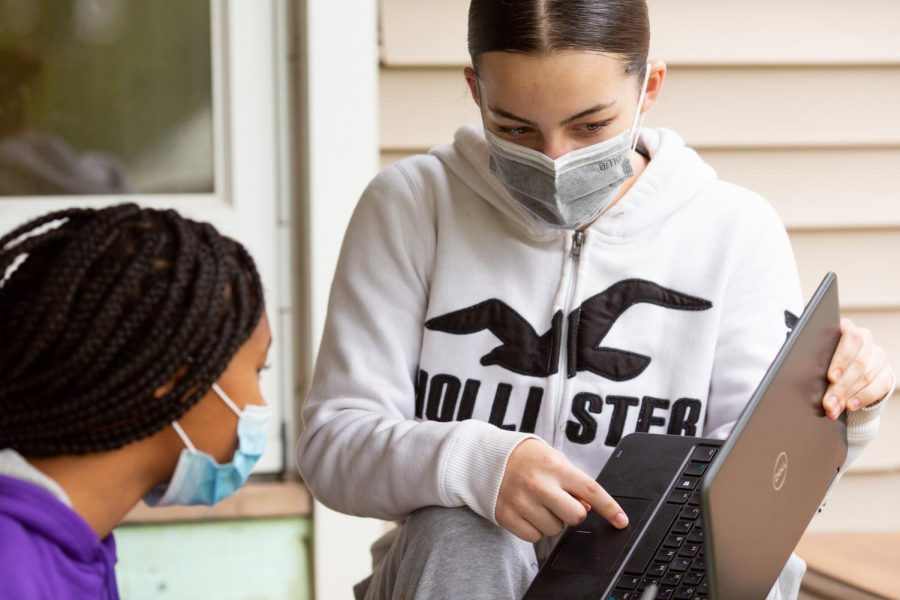COVID-19 Coverage: Enough is enough.
Photo by Allison Shelley for EDUimages
Photo by Allison Shelley for EDUimages
Mar 19, 2021
The number of emergency patients pronounced dead on the scene increased by one 164 percent as of April 2019, according to the Journal of Emergency Medical Services’ article published May 5, 2020. COVID-19 has been one of the number one topics for a year, with good reason, but at this point it’s very repetitive. It causes so much unnecessary stress and anxiety, which brings me to a solution: News stations and media should only show the most important COVID-19 info once a week because it’s repetitively shown on basically every platform and is causing unnecessary stress and anxiety.
To begin, COVID-19 should be talked about less because of how repetitive it has become. According to Maddie Savage’s “Coronavirus: How much news is too much?” published by BBC on May 6,2020, “A separate study released by the Pew Research Center at the end of April found that around seven in 10 Americans say they need to take breaks from news about the coronavirus, and four in 10 say they feel worse emotionally as a result of following the news.” Since COVID-19 has started, more and more people have needed breaks from COVID-19 news. If we picked one day a week to show COVID-19 highlights, then more people would watch because they wouldn’t need a break. As a result, not only would people be less stressed about the news but it would also bring the viewer numbers back up on news platforms. In the same article, it also said, “In times of crisis, people really understand the need for decent journalism…[but] it’s getting overwhelming because there’s basically been nothing but [COVID-19] stories.” Yes, people need good information about COVID-19, but that at this point in time that’s all that is being talked about and it’s causing more problems than solutions.
Secondly, the overwhelming amount of COVID-19 news has caused many people unwanted anxiety and stress, also known as COVID-19 fatigue. According to “How Much COVID-19 News Is Too Much News for Good Mental Health?” published by McLean Hospital suggests that this kind of information overload is “increasing our anxiety by feeding into this belief that if we have enough information, we can control what happens, the more we seek certainty over what will happen in the future, the more anxious we will feel. It is impossible to be 100% certain of what the future holds regarding COVID-19.” You can’t know everything that is happening or is going to happen and that you shouldn’t let it give you extra stress and anxiety because that won’t help you whatsoever. Jacqueline Bullis, PhD, a clinical psychologist in McLean Hospital’s Center of Excellence in Depression and Anxiety Disorders who’s mentioned in the article says, “some amount of [news] is helpful because it reminds us to take appropriate precautions to protect ourselves. But many of us may worry about missing something important..that feeds into the urge to continually check our news feeds or keep the news on all day.” For instance, some news about COVID-19 is good so you know what you’re dealing with, but the moment you make that the only thing you’re worrying about it’s just going to hurt yourself by causing you to overthink and overworry.
Many would argue that you should know as much as possible about COVID-19. According to “How news media is filling public health role during COVID-19” published by the AMA on Sept. 16 2020, “Media is taking on a public health role,” noted panelist Beth Blauer, executive director and founder, Center for Government Excellence at Johns Hopkins University, who lamented the lack of a fully funded U.S. public health infrastructure. “We are having to rely on the media to get these messages out to the public, to get the right information out to the public.” Of course, it’s very important to have the latest information regarding COVID-19 out on social media, especially if health organizations are not getting the funding they need; but the downside is now COVID-19 news has become a giant spam that won’t go away. Additionally, this news is most likely going to be all the same information. This might even cause people stress at the repetition and dig even deeper to find new information which will again cause stress, anxiety and, of course, obsession.
There’s not a 100 percent solution to fixing this problem, but there is one that should be considered. I believe that the media and news stations should pick one day during the week to show all of the important updates about COVID-19 for that week. By doing this, people will still get the info they need, but that won’t be the only thing you see and it has the possibility to make life a little bit more normal. Less stress, less anxiety and less obsession is what everyone needs during this confusing time.

